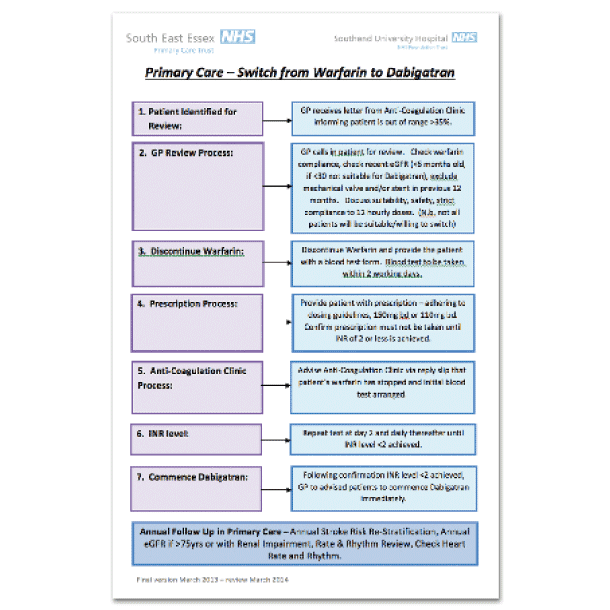Summary
The Southeast Essex AF group consists of commissioners, CCG leads from primary care and champions from stroke, cardiology, clinical pharmacy, haematology and anticoagulation services at Southend Hospital. Formed in 2010, the group achievements include reviewing local arrangements for use of antithrombotic therapies in atrial fibrillation and then developing policies for the integration of NOACs into care pathways. It has also provided education about why not to use aspirin for stroke prevention, as well as on AF and anticoagulation/NOACs. The group also delivered a NOAC clinic to assess patients with poor time-in-therapeutic range, allowing patients to be actively involved in decision making about their anticoagulant treatment options.Challenge
The Southeast Essex AF group was created with a focus of improving anticoagulation and introducing NOACs into standard clinical care. A large proportion (up to 80%) of potentially suitable patients were not switched to a NOAC (where appropriate), putting them at potentially increased risk of stroke.Objectives
To make NOACs available for prescribing within their licensed indications and included in the local formularies resulting in appropriate but effective use across both Southend and Castlepoint & Rochford CCGs. To target groups in whom NOACs should especially be considered. To reduce serious adverse events in patients treated with oral anticoagulants.Solution
The Southeast Essex AF group met bimonthly in order to devise strategies for delivering the objectives, particularly in developing guidelines for integration of NOACs into care pathways and delivering education to healthcare professionals across primary and secondary care. Key groups in whom NOACs should especially be considered were targeted: those having TIA or ischaemic stroke, patients who cannot take vitamin K antagonists and those who cannot be stabilised on VKAs with poor time in therapeutic range. The development of the anticoagulation specialist pharmacist-led NOAC selection, prescribing, switching and follow up support clinic, to which primary & secondary care clinicians can refer in to, was designed to ensure best practice and care for patients (providing specialist knowledge and safety of switching agents), whilst improving patient experience and choice. The Anticoagulant Medicine Review Clinic (MRC) was created to provide the patient with dedicated time with an expert practitioner in anticoagulation to reach a joint, informed decision regarding the best anticoagulant for them. Ongoing work with the DVT service from anticoagulation pharmacists ensures that all nurse specialists in this service are trained to initiate NOACs as an alternative to warfarin.Results
The Southeast Essex AF group met bimonthly in order to devise strategies for delivering the objectives, particularly in developing guidelines for integration of NOACs into care pathways and delivering education to healthcare professionals across primary and secondary care. Key groups in whom NOACs should especially be considered were targeted: those having TIA or ischaemic stroke, patients who cannot take vitamin K antagonists and those who cannot be stabilised on VKAs with poor time in therapeutic range. The development of the anticoagulation specialist pharmacist-led NOAC selection, prescribing, switching and follow up support clinic, to which primary & secondary care clinicians can refer in to, was designed to ensure best practice and care for patients (providing specialist knowledge and safety of switching agents), whilst improving patient experience and choice. The Anticoagulant Medicine Review Clinic (MRC) was created to provide the patient with dedicated time with an expert practitioner in anticoagulation to reach a joint, informed decision regarding the best anticoagulant for them. Ongoing work with the DVT service from anticoagulation pharmacists ensures that all nurse specialists in this service are trained to initiate NOACs as an alternative to warfarin.Learnings
The key to this project’s success was having a group of driven individuals across all the stakeholder parties in primary and secondary care who work together to change practice. Education has been a key part of this project, targeting not only doctors, specialist nurses and pharmacist, but ensuring that letters from clinics are educational as well as functional. The Anticoagulant Medicine Review Clinic’s major challenge was adapting from a busy service of INR monitoring and dose adjusting of VKA anticoagulants, led by non-medical staff (in this case, pharmacists and biomedical scientists) to becoming involved in medical review. This challenge resulted in a steep learning curve throughout the development of this project. The level of engagement required to develop the service, even before delivering the service, is extensive for practitioners who are invariably already very busy.Evaluation
The clinic is cost-effective – the addition of the project to the current service can be achieved using existing practitioners, with costs extending to maintenance of database, and funding staff time. The National Audit office (2011) costs a stroke at £23,315 per year. AF strokes are typically larger and more severe/debilitating, costing 30-40% more than non-AF strokes, driven by extended/complicated hospital stays and rehabilitation, therefore this cost alone does not paint an accurate picture. A disabled patient at home requiring care costs £15,600 per annum. This service only needs to prevent 2 strokes per year to be cost effective.

QiC Hepatitis C Highly Commended
Modernising services, to include NOACs (Novel Oral Anticoagulants)
NOAC implementation into primary and secondary care across Southeast Essex
by Southend University Hospital NHS Foundation Trust
Contacts
Terry Dowling
Job title: Anticoagulation Pharmacist
Place of work: Southend University Hospital NHS Foundation Trust, Prittlewell Chase, Westcliff-on-Sea, Essex, SS0 0RY
Email: terry.dowling@southend.nhs.uk
Telephone: 01702 435555 ext. 5458

